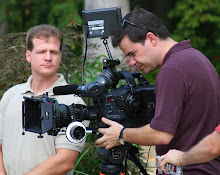Sorry things have been quiet here for a few days. We've had a handful big projects approaching delivery, and things have been hectic.
Which reminds me...
A good friend of mine, also in the motion media biz, was lamenting recently how he'd been spending every waking hour for the past few weeks working on a project, and that he was getting very little time with his family and was exhausted, too.
Which got me thinking. Occasional all-nighters seem to come with the territory in this business, typically when you've got a deadline approaching and that render just keeps on crashing, or some other unforeseen issue crops up. That's normal, and the kind of thing that happens from time to time in most lines of work. Most professionals have to put in extra hours from time to time.
But I have several good friends who have, over the years, allowed this to become a regular thing, just a normal part of how they do business. They are individuals, with no on-site staff, one-man motion graphics and editing shops. And they work crazy hours, regularly, to make deadlines. Why? There a number of ways to look at this.
First of all, maybe they're just really bad at estimating how long it should take to get a job done. We're all guilty of this from time to time, but if you've been in the business more than a few years you should have a fairly good idea of how long a project takes. (And you should have systems in place to charge for overages when things take longer and it's the client's fault.)
I'm pretty sure that's not the case, here. No, in this case I think it's a case of undervaluing themselves, combined with professional pride. They bill out a job based on what they think it "should" take, if a mere mortal were doing it, to be competitive for the client. But they know deep down inside that they are not mere mortals, and that they will tweak and fuss until the job is perfect, until it is satisfying to them. So they know they will spend many more hours than they bill, and are basically giving those hours away, because, well, most artists wouldn't take that extra time, so it's not really billable, right?
You see the flaw in this logic. Taking the extra time is exactly the thing they should be billing for, it's the very thing that sets them apart from the crowd. Sure, some clients won't get it, but many will. And the ones who do are the one's you want, because they appreciate the difference and are willing to pay for the best. You need to educate them. How?
Here's a handy technique. Let's say you put in a bunch of extra hours in the project. Track them, put them on the invoice, and then discount them out. When you deliver to the client, you say, "I wanted you to be aware of the extra time this project required, to get it to the level of perfection I know you and your company appreciate. I'm not billing you for it this time, because we agreed on a price, but we should both be aware of this when we plan for your next project."
So you're setting expectations. You're the hero for going the extra mile but staying on budget, and they know that if they want this level of quality on an ongoing basis it's going to require some extra budgeting on their part. And, framed this way, chances are they will. Some won't, and will try to get you to give it away every time, and that's where you need to be firm.
"I understand you're on a tight budget, so let's work together to see where we can't make some cuts in the scope of this, so we can both have realistic expectations."
As for my pals who put in the crazy hours, well, honestly, I worry about them. I care about them, truly, and the last thing I want is to come to work one day and get word that one of them was found slumped over his keyboard after pulling a series of all nighters.







